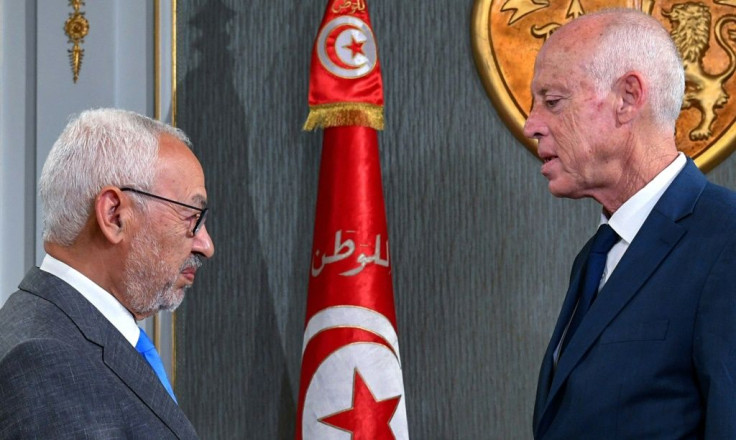What Now For Ennahdha After Tunisia Political 'Earthquake'?
Tunisian President Kais Saied's move to sack the government and dissolve parliament two weeks ago has triggered what experts say is an existential crisis for his nemesis, the Islamist-inspired party Ennahdha.
Despite remaining the most influential party in the decade since the North African country's revolution, Ennahdha was already wracked by internal divisions before last month's "earthquake".
So can it survive, and how?
Ennahdha was founded four decades ago by Rached Ghannouchi, who has remained at the helm ever since despite years of exile under the dictatorship of Zine El Abidine Ben Ali.
After Ben Ali fell in Tunisia's 2011 revolution, Ennahdha made a return to politics and has since been part of every parliamentary coalition backing the country's string of short-lived governments.
Ennahdha is the most organised party in the country and the biggest bloc in the deeply fragmented 217-seat legislature, which is also headed by Ghannouchi.
But since 2014, the party's share of the vote has plummeted.
In elections two years ago it lost 36 of its 89 seats.
In total, since Tunisia's first democratic elections in 2011, it has lost more than a million votes nationwide.
The party has also seen internal fractures in recent years as younger members have demanded changes at the top, including replacing 80-year-old Ghannouchi himself.
Those divisions burst into the spotlight when Saied, a bitter critic of the party system, on July 25 sacked the Ennahdha-supported government and suspended parliament.
Coming after months of public outrage at the government's mishandling of Tunisia's grinding economic and health crises, Saied's move was a crushing blow for Ennahdha.
Some party members have since accused its leadership of putting its existence in danger through their lack of political vision.
Ennahdha had been weakened by an "earthquake" which deepened "internal divisions between those who support Ghannouchi and those calling for him to leave," said analyst and history professor Abdellatif Hannachi.
Some Tunisians opposed to Ennahdha have voiced optimism that Saied's moves will mark the end of the party, a rare example of a Muslim Brotherhood-inspired political movement that has reached -- and remained -- in power in a democracy.
Many within the party, which experienced decades of repression under Ben Ali, fear a campaign of mass arrests or a complete ban.
But analyst Mohamed Sahbi Khalfaoui said Ennahdha's "popular base" could help prevent its demise.
"Completely excluding it from the political scene would be difficult," he told AFP.

But Ennahdha does have certain strengths that mean it is too early to write it off just yet, said Hannachi.
It has the experience and "the capacity to adapt and absorb crises, because it's organised and structured," he said.
The party has repeatedly proven its ability to manoeuvre out of tight spots.
In 2013, facing accusations it was linked to the assassinations of two prominent left-wing activists, Ennahdha quit the government and joined a landmark national dialogue.
The following year, it guaranteed its political survival by forming a coalition with ostensibly secular party Nidaa Tounes.
In 2019, it pulled off a similar move, allying with the Qalb Tounes party of businessman Nabil Karoui.
Since Saied's bombshell announcement on July 25, which Ennahdha initially condemned as "a coup against the revolution and the constitution", the party's rhetoric has dramatically shifted.
On Thursday, its governing council admitted the need for "a profound internal self-critique of its policies" and said it understood "growing popular anger, particularly among youth, as a result of economic and social failings" a decade after the revolution.
Hannachi said Ennahdha was "bending in order to survive the storm".
Saied has ruled out any reversal of his moves.
"What happened with the president showed Ennahdha in a state of huge weakness", said Khalfaoui.
"Unlike in the past, it no longer holds the reins of (Tunisia's) politics."
Ennahdha's chief, who wanted to create a "Muslim democratic" party, remains a key figure of political Islam in the only country whose democracy has survived a decade since the Arab Spring uprisings.
Some Ennahdha members credit him with the party's re-emergence on the political scene since 2011 and a major role in the country's negotiated democratic transition.
For others, the ageing leader exerts an authoritarian grip on the party, saying it has become his personal fiefdom.
Ennahdha's 11th congress, which had been planned for 2020 in order to elect a new leader, has been pushed back to later this year amid sharp differences over Ghannouchi's fate.
The leader, who has already outlasted his maximum permitted term, was now "seen as a burden by part of Ennahdha and its leadership", Hannachi said.
Some want to topple him in order to save the party.
"His future as a political actor... is over," Khalfaoui said.
Whether the party he founded can revive itself without him remains to be seen.
© Copyright AFP 2024. All rights reserved.





















